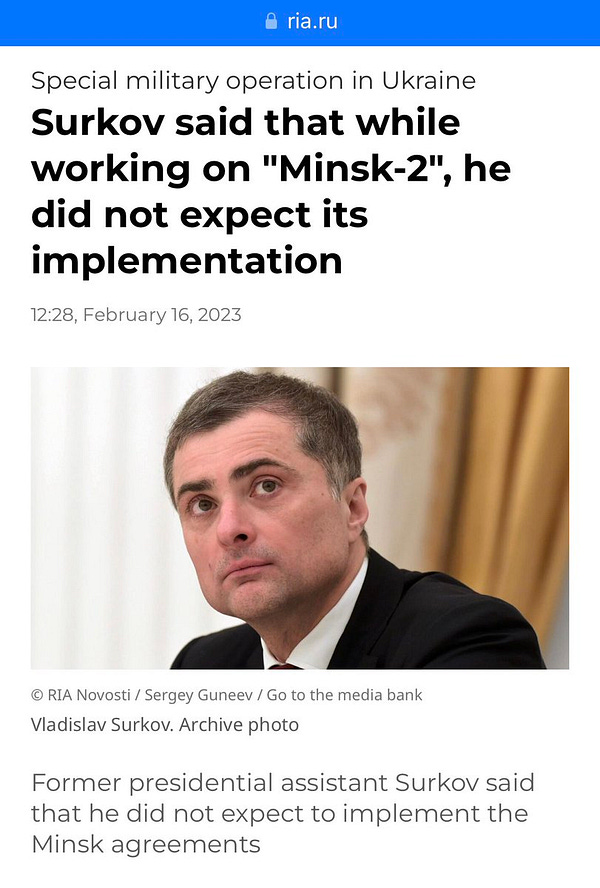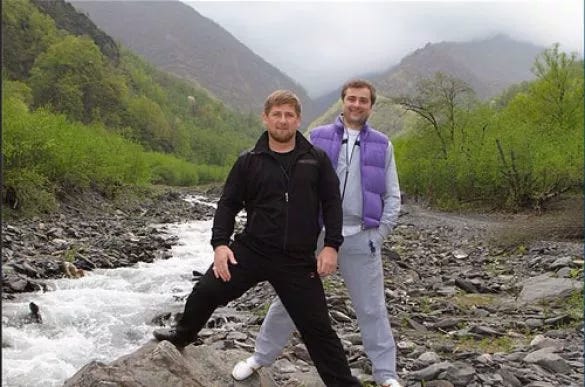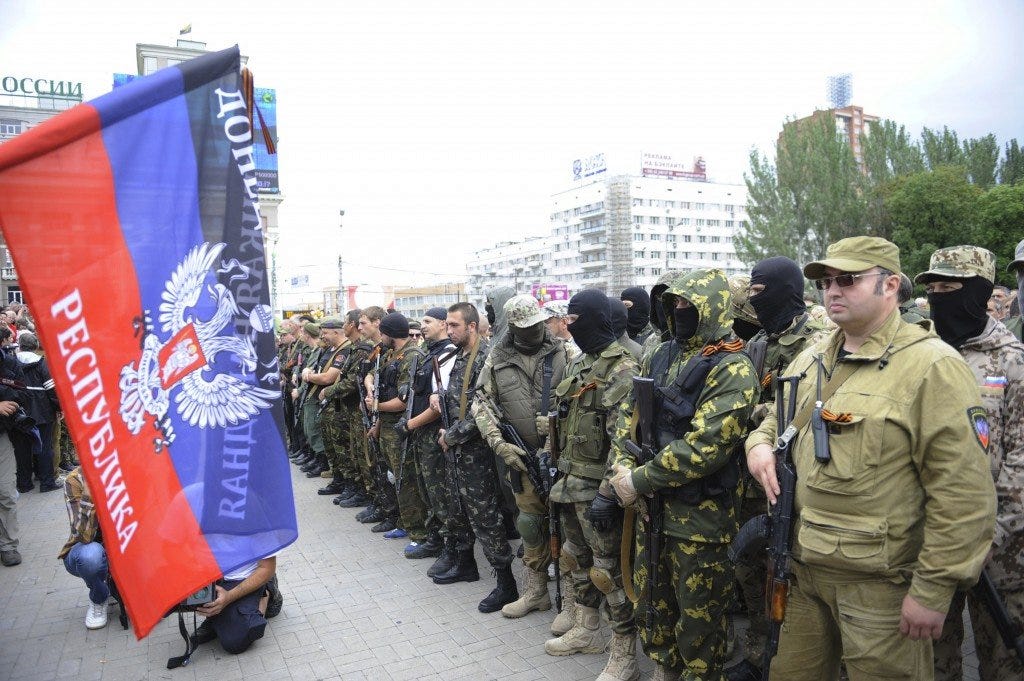Feb 19: Pekka Kallioniemi- on today's menu ...Surkov
Thread published on November 17, 2022, selected readings and interview with Peter Pomerantsev
On today’s menu …Vladislav Surkov


Many perceive Surkov as a key figure behind Putin's power and P. Pomerantsev gave him the nickname "Putin's Rasputin". Vladislav was the key figure in putting Kadyrov to his current position (Kadyrov calls him his "sworn brother" and even has a picture of
him on the wall).
Surkov's approach to geopolitics comes through theatre - he studied theatre direction for 3 years and he's an excellent dramaturg. He is also closely related to a movement called "political technology", which is often referred as "a industry of political manipulation".


Surkov's idea was to make the world of politics into an avantgardist theatre. He suggested that Russia would finance fringe, extreme groups both from the far-left and from the far-right, thus provoking polarization and conflicts. He was also behind Putin's youth movement Nashi.
The goal with this was to destabilize the West so that they'd be stuck on their internal conflicts (BLM is a great example). And then he did something nobody expected - he admitted to all this. Surkov's goal was to confuse people and make them doubt EVERYTHING.
Former FSB officer Igor Girkin (the guy who was responsible for the shooting down of MH17, killing 298 people and was the de facto military commander of separatist troops in Donbas) has stated that Surkov played a decisive role in the creation of the fake country of Donbas.
In Donbas, he acted like any theatre director would: he cast actors, wrote scripts, reviewed people's "performances" and ran promotions, thus creating false credibility for the Donbas "separatists", who were actually just Putin's sock puppets voicing Moscow's goals.

Further Reading…
Alya Shandra, Robert Seely, The Surkov Leaks: The Inner Workings of Russia’s Hybrid War in Ukraine, RUSI
Introduction
THIS PAPER PROVIDES a guide to Russian subversive warfare by examining, in detail, three tranches of leaked emails apparently belonging to Kremlin officials ─ including, primarily and critically, Vladislav Surkov, the man known as President Vladimir Putin’s ‘Rasputin’ ─ who have been closely involved with the Eastern Ukraine conflict, and in particular with the political and economic management of two statelets established by the Kremlin in Donetsk and Luhansk.1 In addition, it examines the strategy and tactics of Russia’s political subversion in the rest of Ukraine. Since the leaking of this information in the media, the emails have become known as ‘The Surkov Leaks’.
Chronologically, the leaks capture the period when Russia was pursuing its ‘Novorossiya’ (New Russia) project, from 2014 onwards, aiming to break off southeastern Ukraine. When this failed, save for the statelets that had been established in Donetsk and Luhansk, the Kremlin switched to promoting a separatist movement within Ukraine, the end goal of which was its federalisation. This campaign continues today.
The end goal of the Kremlin’s actions in Ukraine since 2013 has been to achieve political influence there and, ostensibly, to halt the country’s movement westward ─ which could ultimately result in accession to NATO. On the overt level, this was done via the puppet statelets of Donetsk and Luhansk. At the covert level, Russia interfered in Ukrainian elections, organised and funded a pan-Ukrainian campaign for a ‘soft federalisation’ of the country, attempted to change Ukraine’s constitution and establish an alternative centre of power, and created an illusion of widespread support for these activities. All of these activities were enabled by the intrinsic weaknesses of the Ukrainian state, aided by corruption and a collapse of state authority. The Kremlin also relied on two types of local actors: ideological allies and paid collaborators. The working frameworks for subversion were chiefly developed by Ukrainians, many of whom fled to Russia after Euromaidan. They had an insider’s view of the Ukrainian mind and knew the ‘weak spots’ to aim for.
In effect, Russia’s activity in Ukraine is a reinvention of ‘active measures’, a form of political warfare pioneered by the Soviet Union. The strategy for these active measures is closely linked to a concept known as ‘reflexive control’, a Soviet top-secret technique to manipulate an opponent into making decisions leading to their own defeat. For this, the Kremlin conducted painstaking research into the intricacies of Ukrainian daily life to understand the Ukrainian world view and identify vulnerabilities that could be exploited. Then, using media, front groups, provocateurs and paid rallies, it created a virtual reality designed to compel Ukraine into making decisions serving Russian objectives.
This Occasional Paper is designed to be an aid for researchers, academics, journalists, campaigners, and all those interested in the structure of political subversion, which at times is also called ‘hybrid warfare’. It has often been difficult to find hard evidence of Russian political manipulation, due to the covert nature of elements of this form of conflict. This paper presents leaked evidence, in a wealth of detail, to show a tactical snapshot of subversion, from the costs of demonstrations, to messaging lines, to the tactics of violent destabilisation.
The authors of this paper were not involved in the hacks that led to the leaking of emails allegedly belonging to Kremlin officials. However, the Russian toolkit of subversion is being used not only in Ukraine, but also in other former Soviet states seeking to leave Russia’s sphere of interest, and in Western states too. Therefore, it is overwhelmingly in the public interest that these emails should be examined in detail. It is essential to the future of those former Soviet countries – and to Western democracy writ large – to highlight the covert methods of subversion and control that are being used by the Kremlin. The leaked emails are therefore a unique contribution to the international debate over how the Kremlin ‘curates’ its ‘managed conflicts’. In analysing these emails, this paper also forms part of a wider debate about how authoritarian states use freedom to undermine free or partially free societies.


Henry Foy, Vladislav Surkov: ‘An overdose of freedom is lethal to a state’- Financial Times
“There are two options,” says Vladislav Surkov as we settle into our seats. “The first is Anglo-Saxon. I give you the menu, you can choose what you want. The second option is Russian. There is no choice. The chef chooses for you, because he knows better what you want.” Surkov smiles. “I suggest the Russian option.”
And so begins a meal heavily seasoned with allegory and metaphor, orchestrated by a man who helped to strangle Russia’s infant democracy and replace it with an enfeebled parody of heavily scripted political reality TV that has kept Vladimir Putin in power for 21 years and counting — despite the rising tide of dissatisfaction and unrest at its dwindling economic benefits.
Surkov is a founding father of Putinism, and one of its key enablers. He is the architect of Russia’s “sovereign democracy”, an ostensibly open system with a closed outcome: elections are called, candidates campaign, votes are cast, ballot boxes are opened, and the same man wins, every single time.
Its core idea is that the stability of the state supersedes the freedom of the individual, and entails fake opposition parties, rigid control of the media and impossible barriers to entry for political figures not approved by the regime, offset by the illusion of the traditional trappings of a true democracy.
Grey cardinal, éminence grise, a modern Rasputin, a Russian Richelieu — Surkov exhausts the clichés as the consummate Kremlin backroom operator. Never elected, he was Putin’s chief ideologist and by most accounts his closest political confidant for more than a dozen years, who went on to stage-manage the 2014 annexation of Crimea and Russia’s involvement in the ongoing war in eastern Ukraine. Surkov is either 56 or 58, depending on which biography you believe; in Russian political terms, he is only just reaching his prime. But he is no longer inside the towering red brick walls of the Kremlin, having parted ways with Putin last spring. From scripting Russia’s democracy, he is now simply controlling my diet.
In jeans and a pullover, in a secluded corner of an ostentatious restaurant perched on the roof of a luxury Moscow department store, Surkov says that his departure is irreversible, and that a year away from Putin’s side has taught him “the true meaning of serenity”. He has stayed out of the limelight since departing, publishing some poetry and — he tells me — exchanging political management for political philosophy.







